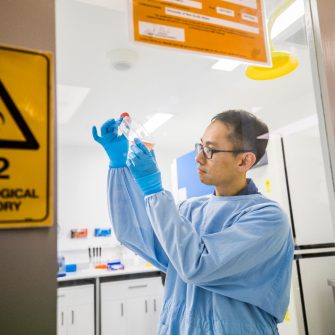Master of Engineering Science (Space Systems Engineering)
- Commencing Terms
- Term 1, 2 & 3
- Duration
- 1 - 2 Year(s)
- Delivery Mode
- Face-to-face (includes blended)
- Campus
-
Kensington
- Codes
- Program code 8338
- CRICOS code 084282A
-
Commonwealth Supported Places are available for this program2025 Indicative CSP first year fee
- $9,500*
-
2025 Indicative CSP fee to complete degree
- $19,000*
-
2025 Indicative first year full fee
- $58,000*
-
2025 Indicative full fee to complete degree
- $121,000*

- Overview
- Entry requirements
- What will I study?
- Future careers
- How to apply
- Fees & Scholarships
Overview
UNSW Master of Engineering Science (Space Systems Engineering) is a two-year postgraduate degree with the School of Electrical Engineering and Telecommunications. The degree is designed for students who already have an accredited engineering degree and want to move into the space industry or pursue research in the sector.
Through the Space Systems Engineering stream, you’ll explore systems engineering in spacecraft and space systems, before delving into the ways these systems are being applied in current and future industries. You’ll take a combination of core and elective courses as well as a year-long practical project. Subject areas you’ll explore include:
- Systems engineering
- Mechanical engineering
- Aerospace engineering
- Electrical engineering
- Satellite systems
- Space mission development
- Space systems engineering
The Master of Engineering Science is a non-accredited program designed to deepen your expertise, so you can dive into an exciting career in space systems.
Why study this degree at UNSW?
When you study the Master of Engineering Science (Space Systems Engineering) at UNSW, you’ll study at the largest electrical and telecommunications engineering school in Australia. We're ranked 1st in Australia and 31st globally for Engineering and Technology by QS World University Rankings by Subject, 2024.
The benefits of studying with the School of Electrical Engineering and Telecommunications at UNSW are vast and include:
- You’ll have the opportunity to collaborate with world-leading research centres at UNSW, including the Australian Centre for Space Engineering Research (ACSER)
- We’re ranked as the top school for research in Australia and within the top 50 globally
- You’ll join a community where diverse perspectives and entrepreneurship are celebrated, giving you opportunities to gain experience in innovative projects and world-leading research.
Want to see more from UNSW Engineering?
Entry requirements
There are two entry points into this Master of Engineering Science specialisation depending on your cognate background. This provides a structured and supportive option for students with a non-cognate background, while enabling students with cognate backgrounds earlier flexibility in their course selection. Both entry points equate to the same duration of 2 years (96 UOC), and differ only in the order and structure of core foundation courses.
Students with a cognate background:
Entry into the Master’s program requires completion of a 4-year Bachelor of Engineering degree (or equivalent) or 3-year Engineering Science degree in a cognate discipline. A minimum 65% average, or its equivalent, throughout the qualifying bachelor’s degree is mandatory.*
Students with a non-cognate background:
Students with a non-cognate background can enter the Master of Engineering Science via the Graduate Certificate in Engineering Science/Master of Engineering Science pathway.
Entry into the pathway requires completion of a 4-year Bachelor of Engineering degree (or equivalent) or 3-year Engineering Science degree in any engineering discipline.
A minimum 65% average, or its equivalent, throughout the qualifying bachelor’s degree is mandatory.*
Successful applicants will be offered entry to the Master of Engineering Science via the Graduate Certificate in Engineering Science/Master of Engineering Science pathway. Students can transition to the Master of Engineering Science after passing 18 UOC of foundational courses. The total study duration is the same as the entry point for students with a cognate background (2 years/ 96 UOC). There is no separate application required for this pathway. Applicants with non-cognate backgrounds must apply for the Master of Engineering Science to be considered for this entry.
*Qualifications from non-211 Chinese Universities will require a 70% average
| Cognate disciplines |
|
Recognition of Prior Learning (Credit Transfer)
UNSW recognises that many students have professional experience or relevant previous studies. If you have worked in a relevant industry or have relevant previous study experience, you may be eligible for credit points that would enable you to complete your Master of Engineering Science in as little as one year, or another accelerated option listed below dependent on your previous study and experience.
-
1.3 Year program:
A 4 year Bachelor Degree with honours (AQF Level 8 equivalent) from any institution in a cognate discipline.
-
1.7 Year program:
A 3 year Bachelor Degree (AQF Level 7 equivalent) from any institution in a cognate discipline.
English language requirements
You may be asked to provide evidence of your English proficiency to study at UNSW depending on your educational background and citizenship. English language skills are vitally important for coping with lectures, tutorials, assignments and examinations - this is why UNSW requires a minimum English language competency for enrolment.
If you’re completing an Australian Year 12 qualification (e.g. NSW HSC or equivalent), you do not need to provide anything extra to prove your proficiency. Your qualification will be used as evidence of your English proficiency.
If you do need to provide evidence of your English proficiency, this will be indicated in your application. You can prove this by providing evidence that you meet one or more of the following criteria:
- English language tests and university English courses
- Prior study in the medium of English
- Other qualifications
If you need to improve your English skills before you start your degree, UNSW College’s Academic English Programs are for you. The programs are suitable for various English levels and help you prepare for university studies and life in Australia.
For more details, visit the English Language Requirements page.
There are two entry points into this Master of Engineering Science specialisation depending on your cognate background. This provides a structured and supportive option for students with a non-cognate background, while enabling students with cognate backgrounds earlier flexibility in their course selection. Both entry points equate to the same duration of 2 years (96 UOC), and differ only in the order and structure of core foundation courses.
Students with a cognate background:
Entry into the Master’s program requires completion of a 4-year Bachelor of Engineering degree (or equivalent) or 3-year Engineering Science degree in a cognate discipline. A minimum 65% average, or its equivalent, throughout the qualifying bachelor’s degree is mandatory.*
Students with a non-cognate background:
Students with a non-cognate background can enter the Master of Engineering Science via the Graduate Certificate in Engineering Science/Master of Engineering Science pathway.
Entry into the pathway requires completion of a 4-year Bachelor of Engineering degree (or equivalent) or 3-year Engineering Science degree in any engineering discipline.
A minimum 65% average, or its equivalent, throughout the qualifying bachelor’s degree is mandatory.*
Successful applicants will be offered entry to the Master of Engineering Science via the Graduate Certificate in Engineering Science/Master of Engineering Science pathway. Students can transition to the Master of Engineering Science after passing 18 UOC of foundational courses. The total study duration is the same as the entry point for students with a cognate background (2 years/ 96 UOC). There is no separate application required for this pathway. Applicants with non-cognate backgrounds must apply for the Master of Engineering Science to be considered for this entry.
*Qualifications from non-211 Chinese Universities will require a 70% average
| Cognate disciplines |
|
Recognition of Prior Learning (Credit Transfer)
UNSW recognises that many students have professional experience or relevant previous studies. If you have worked in a relevant industry or have relevant previous study experience, you may be eligible for credit points that would enable you to complete your Master of Engineering Science in as little as one year, or another accelerated option listed below dependent on your previous study and experience.
-
1.3 Year program:
A 4 year Bachelor Degree with honours (AQF Level 8 equivalent) from any institution in a cognate discipline.
-
1.7 Year program:
An AQF Level 7 undergraduate qualification from any institution in a cognate discipline.
Admission pathways
If you do not meet the requirements for direct entry into your chosen degree, you may be eligible for a pathway program with UNSW College. UNSW College provides alternative entry options using university-approved content so that you can start your UNSW journey with confidence.
English language requirements
You may be asked to provide evidence of your English proficiency to study at UNSW depending on whether you are from an English-speaking background or non-English speaking background. English language skills are vitally important for coping with lectures, tutorials, assignments and examinations - this is why UNSW requires a minimum English language competency for enrolment.
If English is not your first language, you’ll need to provide proof of your English proficiency before you can be given an offer to study at UNSW. You can do this by providing evidence that you meet one or more of the following criteria:
- English language tests and university English courses
- Prior study in the medium of English
- Other qualifications
If you need to improve your English skills before you start your degree, UNSW College’s Academic English Programs are for you. The programs are suitable for various English levels and help you prepare for university studies and life in Australia.
For more details, visit the English Language Requirements page.
Check the specific English language requirements for this program
Program structure
When you choose to study a Master of Engineering Science, you’ll choose from one of 26 specialisations which will help you make your next career move.
Within these specialisations your study will include:
- Enquiry-based courses
- Disciplinary courses
- Engineering and Technical Management Courses.
You’ll be able to tailor your degree to your interests by combining courses in your chosen specialisation with elective courses.
You’ll also have the chance to work on a complex, open-ended enquiry-based research project.
Full program structure
Degree structures can vary depending on your specialisation of choice, the number of courses you choose and timetabling, to give you an indication you can consider the below.
Depending on your specialisation and your previous studies/professional experience you may study:
- At least 4 Disciplinary Courses
- At least 4 Advanced Disciplinary Courses
- At least 1 Engineering and Technical Management Course
- At least 3 enquiry-based courses (which includes a research project)
- At least 4 elective courses (across Disciplinary, Advanced Disciplinary and Engineering and Technical Management courses)
Through the Disciplinary and Advanced Disciplinary Knowledge courses you’ll learn the technical knowledge and skills you need for your chosen specialisation. You’ll also update your knowledge in cutting-edge developments in your area of interest.
Engineering and Technical Management courses help you build skills in communicating and justifying professional decisions, employing ethical approaches to practice, and developing the abilities required for roles more focused on project and or staff management, leadership and strategy.
You’ll complete a research project in this degree within the enquiry-based courses. In this you can choose to develop your Postgraduate Research skills to assist with the research project component of the degree or as your first step towards a Higher Degree Research (PhD) program. Or you can complete a “Launching a Startup” course where you will be equipped with the skills necessary to successfully commercialise your ideas.
Future careers
You’ll graduate from the Space Systems Engineering Science stream with a deep understanding of space engineering, as well as a breadth of knowledge and experience in related disciplines.
As a Space Systems Engineer, you’ll enter an industry with exploration, innovation and discovery at its heart. Your expertise will set you up to work in roles where you’ll plan, develop, deploy, test and optimise systems related to space exploration and research.
The demand for systems engineers is high and the skills and experience you gain at UNSW Engineering will set you up to work in diverse roles and sectors, including:
- Space systems engineering
- Mechanical engineering
- Computer networks
- Aerospace engineering
- Electrical engineering
- Project management
- Mechatronics
- Software engineering
- Structural engineering
- Professional, technical and scientific services
- Information media and telecommunications
During your time at UNSW, you’ll be able to take advantage of our connections with leaders in the industry, like NASA, forging important networks before you graduate. Other UNSW Engineering industry partners include:
- Raytheon
- CISCO
- US Office of Naval Research
- Thales
- Huawei
UNSW Engineering graduates are some of the most sought-after professional engineers in Australia and abroad thanks to the reputation of our research and teaching.
How to apply
Applications must be submitted through our Apply Online portal. We encourage you to submit your completed application as early as possible to ensure it will be processed in time for your preferred term. Some high-demand programs and Faculties with limited places may have an earlier application deadline or commencement date. Find out more.
Ready to start your application?
For most international students, applications are submitted via our Apply Online service. We encourage you to submit your completed application as early as possible to ensure it will be processed in time for your preferred term.
Some high-demand programs with limited places, may have an earlier application deadline or may have an earlier commencement date. For more information visit our international applicant information page.
Ready to start your application?
Fees & Scholarships
$9,500*
$19,000*
All places within this degree are Commonwealth supported. This means that if you receive an offer from UNSW Sydney as a domestic student, you will have a substantial proportion of your fees subsidised by the Australian government. Start your application today with our guide on how to apply.
Commonwealth Study Assistance such as Austudy and Youth Allowance is available for some master's degrees. For the most up-to-date information and list of degrees visit UNSW Current Student Financial Support.
*The indicative Commonwealth Supported Place (CSP) fees are an estimate based on the relevant student contribution band/s for a Commonwealth Supported Place undertaking a standard full-time load of 48 units of credit per year (1 Equivalent Full Time Student Load/1 EFTSL). To find out more about Commonwealth Supported Places visit Postgraduate Commonwealth Support.
Indicative fees are a guide only and have been calculated based on the typical enrolment patterns of students undertaking the degree/program. The indicative fee listed here is an estimate for tuition only and excludes non-tuition fees and charges. The amount you pay will vary depending on the calendar year of enrolment, the courses you select and whether your study load is more or less than 1 Equivalent Full Time Student Load (48 units of credit (UOC) per year).
You should not rely on indicative fees as fee increases are assessed when required and may exceed the indicative figures listed here. Actual fees are calculated on enrolment. More information on fees can be found at the UNSW fees website.
*Fees are subject to annual review by the University and may increase annually, with the new fees effective from the start of each calendar year. The indicative fees listed here are based on an estimated average and are for tuition only, other fees and charges are not included. The amount you pay will vary depending on the calendar year to enrol, the courses you select and whether your study load is more or less than 1 Equivalent Full Time Student Load (8 courses per year).
Indicative fees are a guide for comparison only based on current conditions and available data. You should not rely on indicative fees. More information on fees can be found at the UNSW fees website.
Indicative fees to complete the program have been calculated based on a percentage increase for every year of the program. Fee increases are assessed annually and may exceed the indicative figures listed here.
Indicative fees to complete the program include tuition plus an estimate of study-related costs of approximately $1,000 per year. To find out more about other costs, visit UNSW International.
Scholarships
At UNSW, we award over $83 million in scholarships each year. We pride ourselves on rewarding excellence and making university accessible to students from all walks of life. Whether you’re a domestic or international student, our range of scholarships, prizes and awards can support your journey.
Featured scholarship
The UNSW Women in Engineering Research Scholarship was established to assist women of high academic achievement with an interest in a research and/or an academic career in engineering. UNSW Engineering offers two Women in Engineering Top-up Scholarships every semester.
Apply here and search for ‘Engineering’ in the keywords.

QS World University Rankings, 2025.

AFR Top 100 Future leaders Award.

#1 Australian uni attended by start-up founders.




